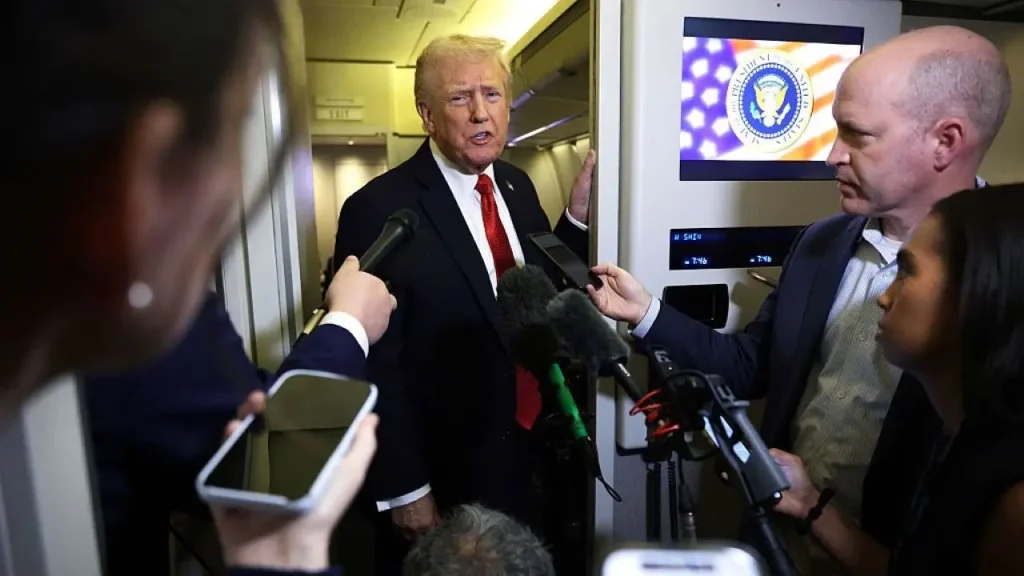Trump Criticizes Virginia Democratic AG Nominee Jay Jones Over Controversial Texts
In a striking moment aboard Air Force One, President Donald Trump didn’t mince words when discussing Virginia Democratic attorney general nominee Jay Jones. Trump condemned Jones as an “animal” who “should not be allowed to be running for office” after text messages surfaced showing Jones fantasizing about violence toward a Republican lawmaker. The president expressed disbelief that someone could remain a candidate after such revelations, suggesting that “anybody would be put in prison for what he said.” This strong rebuke came just days after Jones had criticized Trump during a campaign debate in Virginia, creating a tense political exchange that has now drawn national attention to a state-level race.
The controversy centers around text messages Jones sent in 2022 to Virginia state lawmaker Carrie Coyner, where he imagined a scenario of shooting “two bullets” into then-House Speaker Todd Gilbert’s head. In these messages, Jones compared Gilbert unfavorably to dictators Pol Pot and Adolf Hitler, and even referred to Gilbert’s young children as “fascists.” Since these texts were reported, Jones has issued apologies, saying he is now “embarrassed” by the messages. However, the revelation has cast a shadow over his campaign and created difficult questions for fellow Democrats who previously endorsed him, highlighting how violent rhetoric—even in private communications—can dramatically alter political trajectories when brought to light.
Despite the severity of the controversy, many prominent Virginia Democrats have maintained their support for Jones. Gubernatorial candidate Abigail Spanberger, who endorsed Jones before the text messages became public, has notably declined to withdraw her endorsement. Her campaign continues to sell Jones-branded merchandise on its website, suggesting a reluctance to distance herself from the embattled attorney general candidate. This continued support has itself become a point of criticism, with opponents arguing that maintaining ties to Jones reflects poor judgment and prioritizes partisan politics over condemning threatening rhetoric against political opponents.
The Republican Governors Association has seized on this dynamic, criticizing Spanberger for continuing to support Jones and sell merchandise associated with him. RGA rapid response director Kollin Crompton directly questioned how voters could trust Spanberger as governor if she “is willing to put partisan politics above doing the right thing and standing up to political violence.” This critique frames the controversy not just as a problem for Jones personally, but as a reflection on the judgment of those who continue to stand by him, suggesting that political violence should transcend partisan loyalties as something universally condemned.
The Jones controversy illustrates how quickly modern political campaigns can be upended by past communications, especially those containing violent imagery. What began as private text messages between colleagues has transformed into a national story that touches on broader themes of political polarization and the limits of acceptable rhetoric. Jones’ texts, which he now disavows, speak to a concerning trend where political opponents are sometimes characterized in dehumanizing terms or as existential threats rather than as fellow citizens with differing viewpoints. The swift and severe backlash demonstrates that most voters still expect a basic level of decorum and respect in political discourse, even in today’s highly charged partisan environment.
As Virginia’s election approaches, this controversy serves as a reminder of how personal character and temperament remain crucial factors in voters’ decisions. Beyond policy positions or partisan affiliations, voters must evaluate whether candidates demonstrate the judgment and self-control necessary for public service. For Jones, these texts—regardless of his current regret—raise serious questions about his fitness for an office tasked with upholding justice and the rule of law. For other politicians navigating whether to support or distance themselves from Jones, the situation presents a test of their own values and priorities, forcing them to weigh political alliances against ethical standards in a way that voters will ultimately judge at the ballot box.














